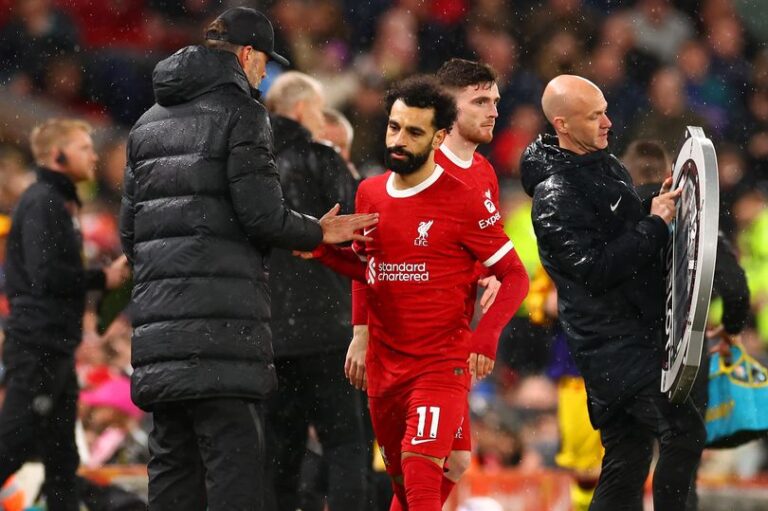Forget miracles. Now Liverpool have no option but to cope with a dose of cold, harsh reality as they prepare for the final weeks of Jurgen Klopp’s reign.
The dream of a Europa League final farewell and the Reds boss completing the set of major honours under his tenure may have realistically been extinguished during the harrowing first leg at Anfield a week ago.
But it would be pushing matters to suggest this return in Bergamo pointed to what might have been for Liverpool, despite earning themselves some solace of victory on the night and ending a run of successive defeats.
There had been the early hope offered by Mohamed Salah notching a penalty, with those looking for omens quick to point out the minute in which it was converted – the seventh – was the same as when Divock Origi opened the scoring on that famous night against Barcelona five years ago
The outcome of this tie, though, was settled long before the final whistle, with Atalanta content to play the percentages in the second half as the early enthusiasm and creativity from Klopp’s side began to wane. Indeed, Liverpool failed to create a chance of note after the break.
While Klopp was keen before the match to play down comparisons with the Barcelona fightback, he did repeat his message that, should Liverpool fall short, they should “fail in the most beautiful way”.
This was not that. In fact, in some ways, it was downright ugly. But it could easily have been different had Salah converted an easy chance shortly before half-time when released by Cody Gakpo. That, though, encapsulated another poor performance from the Egyptian, whose form is now becoming a genuine concern, not least with the Premier League title race reaching the final sprint.
The win should at least offer Liverpool some confidence as they begin a tricky spell of three away top-flight games inside a week, and there were other positives. Trent Alexander-Arnold was lively on his first start in more than two months, Gakpo again looked sharp, Alisson Becker was self-belief personified between the sticks and Alexis Mac Allister worked hard in midfield. And there were sufficient flashes during the general first-half performance of his team to give Klopp something on which to build during the closing weeks.
History, though, was very much against Liverpool here, who had failed to progress in European competition on all four previous occasions they’d lost the first game of the tie at Anfield. And in the entirety of the Europa League and its predecessor the UEFA Cup, of 132 times the away side had previously won the first leg by three or more goals, they had progressed on every single occasion.
Klopp resisted the urge to throw everything at Atalanta from the first whistle having spoken before the game of Liverpool simply playing their usual game but to a far better standard than in the first leg.
That said, perhaps learning from his mistake in the first leg, he named a strong starting line-up, and the obvious need for goals – plus a desire to break out of the Atalanta man-marking that so suffocated Liverpool at Anfield – meant there were some fluid tactical changes throughout the first half.
While centre-backs Ibrahima Konate and Virgil van Dijk and number six Mac Allister were largely fixed in their roles, everyone else appeared to have a certain level of freedom.
Gakpo, leading the attack, caused Atalanta problems with trademark runs from deep and a willingness to use his physicality, with Liverpool having been outmuscled for long spells last week. Luis Diaz drifted inside, Dominik Szoboszlai pushed high and Andy Robertson was occasionally the furthest man forward from left-back.
